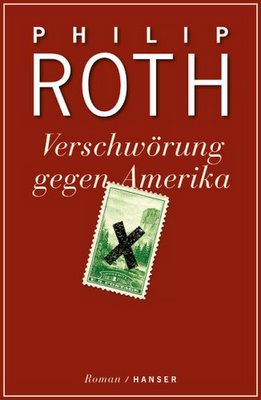American Nightmoral
Catchy title, no? Let me self-congratulate. A google search comes up empty, until now I guess. This is not a "Top 20" post, but one of a rarer sort. I completed a book, in conjunction with the Bay Ridge Jewish Center's Book Club, I just finished reading Philip Roth's The Plot Against America.
This is not a "Top 20" post, but one of a rarer sort. I completed a book, in conjunction with the Bay Ridge Jewish Center's Book Club, I just finished reading Philip Roth's The Plot Against America.
This frightening novel, a fictional "what if...." scenario, is extremely riveting, as the reader is confronted by an America that takes a turn for the worse when Charles A. Lindbergh defeats FDR in the 1940 presidential election.
Roth is a great writer, although he has not cracked my top 20 list which is, admittedly a tough list to make. I also must admit that I have not read a lot of Philip Roth, only Portnoy's Complaint and Sabbath's Theater.
Portnoy is a classic, but Sabbath's Theater was my favorite of the three I have read. I also acknowledge that he has written numerous other books that have received awards and acclaim that are most likely very good as well. I started American Pastoral, but my attention wandered and I moved on.
Nonetheless, I would recommend The Plot Against America as a valuable lesson in alternate history. Of course, one of the most famous "alt-history" books is by another Philip, the science fiction pioneer Philip K. Dick, whose The Man in the High Castle envisions a futuristic world in which, if you judge a book by its cover, the Germans and Japanese won WWII. In so mentioning ths book, I realize that Dick isn't on the top 20 list, either, and I gave pause to consider if that was not a grave error on my part. After some reflection, I would say no, that despite reading a dozen of his books, that the novels tend to blend in to one another in a rather Dickian paranoia, that his short stories tend to be stronger. With that in mind, it is no surprise that his posthumous contributions as the man in the "film based on the short story by" are the basis for his growing cult status. His official site is a rather nice place to start, if you're interested in reading some of his work.
But this post started with Roth and so it shall end. The swastika is featured prominently on the book's cover, as anti-semitism during the 1940's is the driving force behind this good novel. I thought it would be interesting to see how the cover of the book appeared in Germany, where the symbol is illegal: 
Interesting, and I'll leave you on this note. Obviously the swastika is gone but, it should be noted, the title has changed in translation to The Conspiracy Against America. Why change the title? Too inflammatory? Is the word plot not in the German language? Something to wonder about...

2 comments:
Let us not forget Stephen Fry's "Making History" in which an earnest history graduate student and an aging German physicist prevent Adolf Hitler's conception resulting in a brave new world that is in some ways better than ours but in most ways even worse. For those of you unfamiliar with Stephen Fry, he is a brilliant British comedian and author. The book was well worth the read.
As a german speaker, I'd like to point out that "Verschwörung" is a good translation of "plot", since the difference between "plot" and "conspiracy" is hard to express in German. "Komplott" would have been closer but it's an old word and nowadays largely synonymous with "Verschwörung".
Changing the cover to replace the swastika with an X is indeed weird. Normally, the swastika is allowed to be used for educational publications but possibly the publisher didn't want to attract readers that considered the alternative history to be rather better than the actual history. There always have been those in Germany.
Aside from that, it's a great and shocking book, it taught me much about anti-semitism and how fragile democracies are, how quickly and willingly people succumb to violence and hate.
Post a Comment